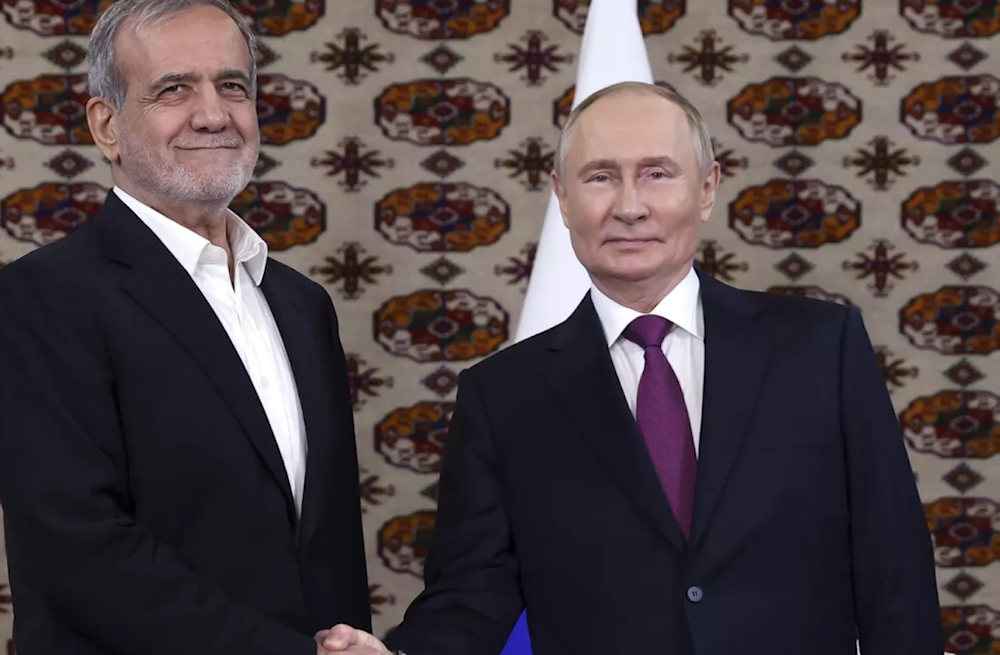Foundations of unilateralism, unipolar world crumbling: Pezeshkian
The Iranian president encouraged BRICS and BRICS+ to establish and execute a transparent, fair, inclusive, and non-discriminatory framework based on global trade standards, with a particular emphasis on emerging and underdeveloped nations.
-

Russian President Vladimir Putin and Iranian President Masoud Pezeshkian pose for a photo during their meeting on the sidelines of an International Forum on October 11, 2024. (AP)
During his speech at the BRICS+ summit in Kazan, Russia, on Thursday, Iran's President Masoud Pezeshkian voiced his belief that the roots of unilateralism and the existing unipolar world are collapsing.
According to Pezeshkian, the effort to create friendly and constructive relations is a reality in our day, noting that many nations actively want to get rid of unilateralism.
He noted that the group's ambitions have helped it become a successful model of collaboration and convergence among nations on the regional and international stages since its inception.
He highlighted that a better world will be developed when there are no sanctions, willful imposition, aggression, war, conquests, or genocides, explaining it would be a place where multilateralism prevails, discrimination is replaced with equity, transparency is chosen over deception, democracy is preferred over authoritarianism, and war has been ended through dialogue.
Unilateralists will obstruct access to technology
The Iranian president emphasized that illegitimate sanctions harm international relations by preventing countries from accessing their own financial resources and hindering international cooperation to combat climate change, environmental degradation, and humanitarian help.
Pezeshkian encouraged BRICS and BRICS+ to establish and execute a transparent, fair, inclusive, and non-discriminatory framework based on global trade standards, with a particular emphasis on emerging and underdeveloped nations.
He stated that nations that support unilateralism would continue to obstruct developing countries' access to contemporary technology, emphasizing the importance of accelerating collective collaboration and sharing expertise to fight such movements.
The president cautioned that many development processes have experienced various hurdles as a result of coercive tactics and political bias, lamenting that long-term progress toward a safer and more prosperous world has been hindered.
Elsewhere in his talk, Pezeshkian highlighted regional developments over the last year and the major danger to West Asia's peace and security, and stated the Israeli occupation has broken several red lines, violating international law on a number of occasions.
Pezeshkian accused "Israel" of adding another dark chapter to its history of mass atrocities by unleashing a fresh wave of bloodshed and terror.
The Iranian president also said that international institutions, notably the United Nations Security Council, are insufficient to settle the current war in Gaza and Lebanon, noting that the US and Western governments' consistent backing for the Israeli regime has made it harder to create lasting peace in Gaza and Lebanon.
BRICS authority, influence in global affairs continually rising: Putin
During a closed-door session at the 16th BRICS summit in Kazan on Wednesday, Russian President Vladimir Putin indicated that the multipolar world is evolving.
He emphasized that the BRICS nations play a vital role in promoting global stability and security, significantly contributing to the resolution of pressing regional issues.
"This is the essence of the strategy of the BRICS course in the international arena, which meets the aspirations of the main part of the international community — the so-called global majority. And it is precisely this course that is especially in demand in the current conditions when truly significant changes are taking place in the world," Putin said.
He said that Russia seeks to strengthen the role of BRICS in the world and focus on solving global and local problems, adding, "We sought to strengthen the authority of BRICS, to increase its role in world affairs, in solving pressing global and regional problems."
In this context, the Russian leader expressed his belief that all interested nations should be afforded the opportunity to join BRICS. He asserted that it would be a mistake for BRICS to overlook the unprecedented interest from countries in the Global South and East seeking to become part of the association, highlighting the importance of inclusivity in fostering global collaboration.
"More than 30 states have already expressed this desire in one form or another. At the same time, it is necessary to maintain a balance and prevent a decrease in the effectiveness of the BRICS," Putin said.

 4 Min Read
4 Min Read








